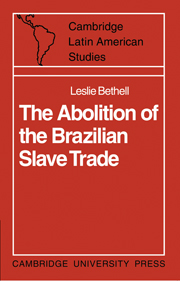Book contents
- Frontmatter
- Contents
- Preface
- Maps
- Abbreviations
- 1 First steps towards abolition, 1807–1822
- 2 Independence and abolition, 1822–1826
- 3 Brazil and the slave trade, 1827–1839
- 4 Treaty negotiations, 1830–1839
- 5 The British navy and the mixed commissions, 1830–1839
- 6 The extension of Britain's powers, 1839
- 7 Britain and the slave trade, 1839–1845
- 8 Slave trade, slavery and sugar duties, 1839–1844
- 9 Lord Aberdeen's Act of 1845
- 10 The aftermath of the Aberdeen Act
- 11 Changing attitudes and plans of action, 1845–1850
- 12 Crisis and final abolition, 1850–1851
- 13 The aftermath of abolition
- Appendix: Estimates of slaves imported into Brazil, 1831–1855
- Bibliography
- Index
4 - Treaty negotiations, 1830–1839
Published online by Cambridge University Press: 04 August 2010
- Frontmatter
- Contents
- Preface
- Maps
- Abbreviations
- 1 First steps towards abolition, 1807–1822
- 2 Independence and abolition, 1822–1826
- 3 Brazil and the slave trade, 1827–1839
- 4 Treaty negotiations, 1830–1839
- 5 The British navy and the mixed commissions, 1830–1839
- 6 The extension of Britain's powers, 1839
- 7 Britain and the slave trade, 1839–1845
- 8 Slave trade, slavery and sugar duties, 1839–1844
- 9 Lord Aberdeen's Act of 1845
- 10 The aftermath of the Aberdeen Act
- 11 Changing attitudes and plans of action, 1845–1850
- 12 Crisis and final abolition, 1850–1851
- 13 The aftermath of abolition
- Appendix: Estimates of slaves imported into Brazil, 1831–1855
- Bibliography
- Index
Summary
So long as Brazilian governments proved unable or unwilling to enforce their own legislation prohibiting the importation of slaves into Brazil in the period after 1830, Britain, or to be more precise the British navy, represented the only serious threat to the continued existence of the illegal Brazilian slave trade. And the navy's success or failure in containing the Brazilian slave trade—it was doubtful whether, without the co-operation of Brazil, the British navy could ever completely suppress it—was not dependent solely on the number of warships available for anti-slave trade duties. It was also, and more immediately, dependent on the extent to which the necessary powers to visit, search and capture slave vessels in the Brazilian trade had been accorded British warships under the various anti-slave trade treaties which Britain had signed with Brazil and other foreign powers.
Considering the attention Canning had devoted to the precise nature of the treaty Britain had extracted from Brazil in 1826, it is remarkable how little thought he seems to have given to the crucial question of how the Brazilian slave trade, once illegal, could be suppressed by the British navy if, as seemed likely even at the time, the Brazilian government failed to fulfil its treaty obligations. For three years (1827–30) the Brazilian trade remained illegal only north of the equator and the treaty of 1826 provided that, during this period, British cruisers should continue to operate under the Anglo-Portuguese Right of Search Convention of 1817; an Act of 2 July 1827 (7 and 8 Geo. IV cap. 74) authorised Anglo-Brazilian mixed commissions, which were to sit in Rio de Janeiro and Sierra Leone, to adjudicate any Brazilian ships captured north of the line—provided they were carrying slaves.
- Type
- Chapter
- Information
- The Abolition of the Brazilian Slave TradeBritain, Brazil and the Slave Trade Question, pp. 88 - 121Publisher: Cambridge University PressPrint publication year: 1970
- 1
- Cited by

